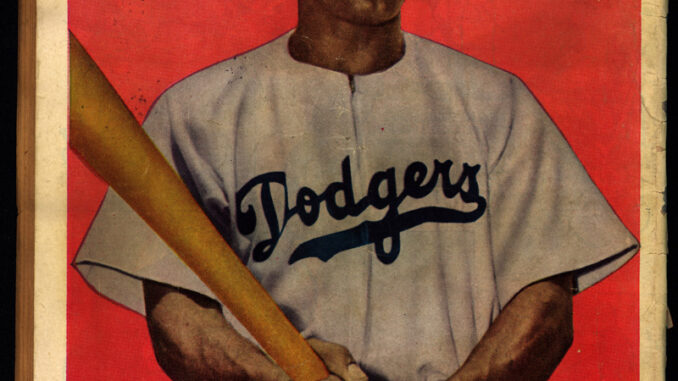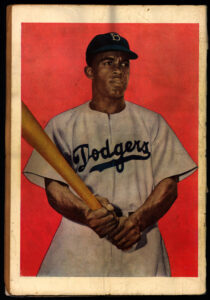

Credit: Library of Congress Prints and Photographs Division [LC-USZC4-6147
The exhibit features photographs and other memorabilia from Robinson’s time as a professional baseball player, including many personal photos never before on public view. Why was Robinson such an important baseball player?
Who Was He?
Jackie Robinson was the first African American professional Major League baseball player. The Brooklyn Dodgers started him at first base on April 15, 1947, putting an end to what was known as the “baseball color line.” Because of this, Robinson became an important symbol of the wider changes that happened during this time period that United States historians call the civil rights movement.
Robinson was awarded Rookie of the Year honors in 1947, the National League Most Valuable Player award in 1949, and was a World Series champ in 1955. In 1962, he became the first black player to be inducted into the Baseball Hall of Fame in Cooperstown, New York.
What Happened Next?
While Robinson excelled as a ballplayer, he didn’t stop there. After retiring from major league baseball in 1957 at the age of 37, Robinson used the fame he received from his career to further advance the civil rights movement. Robinson was not afraid to be a vocal activist for change. In 1957, he served as chair of the NAACP’s Freedom Fund Drive, and in 1964, he helped establish the Freedom National Bank, an African American-owned and -operated commercial bank based in Harlem, New York. He later went on to create the Jackie Robinson Construction Company, which built housing for low-income families.
Robinson also continued breaking barriers within the sports world. He became ABC television network’s first African American sports announcer. Robinson was also an outspoken critic of the lack of minority managers in the major leagues.
How Is He Remembered?
Unfortunately, Robinson died in 1972, at only 53 years old. His uniform number (42) was retired in 1997 across all Major League teams. Major League Baseball continues to celebrate Jackie Robinson Day each year on April 15. For his work as a leader in the civil rights movement, Robinson was posthumously awarded the Congressional Gold Medal and the Presidential Medal of Freedom.
